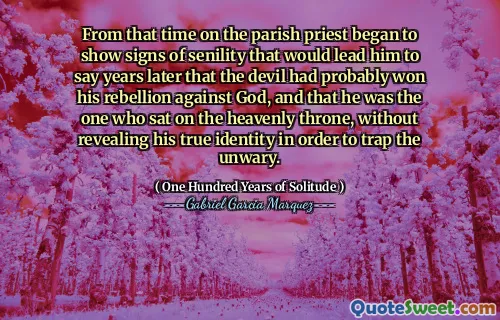
The air was so damp that fish could have come in through doors and swum out the windows, floating through the atmosphere in the rooms. One morning Ursula woke up feeling that she was reaching her end in a placid swoon and she had already asked them to take her to Father Antonio Isabel, when Santa Sofia de la Piedad discovered that her back was paved with leeches. She took them off one by one, crushing them with a firebrand before they bled her to death.
This vivid and surreal passage from Gabriel García Márquez's One Hundred Years of Solitude instantly draws readers into a world where the ordinary morphs seamlessly into the extraordinary. The imagery of damp air thick enough for fish to swim through rooms conjures a dreamlike quality, emphasizing the suffocating atmosphere not only literally but metaphorically, encapsulating the sense of entrapment and decay in Macondo. Ursula's lingering on the brink of death and the grotesque discovery of leeches on her back symbolize the parasitic burdens that plague the Buendía family—both physical and emotional. The act of crushing leeches with a firebrand is potent with desperation but also with a fierce, almost primal will to survive against invasive threats. Márquez's language expertly fuses the mundane with the magical, an embodiment of magical realism, blending tangible human experiences with surreal elements to evoke deeper psychological and existential themes. This passage wrestles with mortality, decay, and the cyclical nature of suffering. It invites reflection on how even in moments of decline, there is an active struggle against forces that seek to leech life and vitality away. Moreover, it highlights a theme prevalent throughout the novel: endurance amidst overwhelming odds. The dampness poisoning the atmosphere, the leeches feeding silently—these are metaphors for the inescapable conditions and histories that the characters must confront. Márquez encapsulates the tension between life and death, detachment and connection, decay and resilience with haunting imagery, demonstrating why One Hundred Years of Solitude remains a powerful literary experience that blends melancholy with magical reality.







